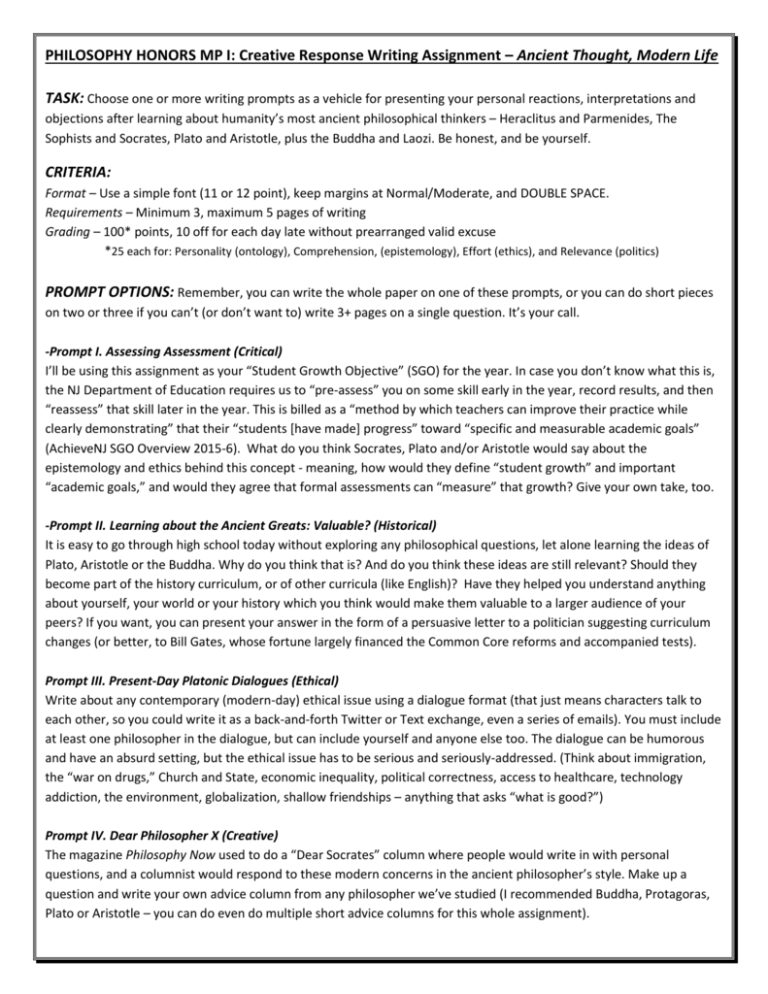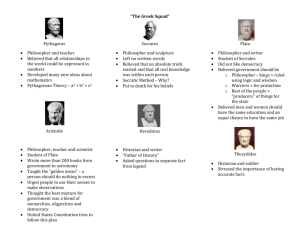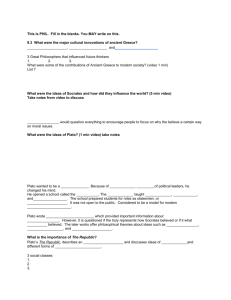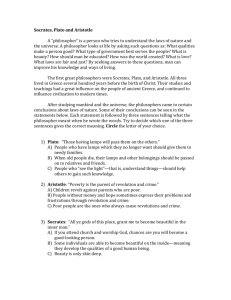as Word doc
advertisement

PHILOSOPHY HONORS MP I: Creative Response Writing Assignment – Ancient Thought, Modern Life TASK: Choose one or more writing prompts as a vehicle for presenting your personal reactions, interpretations and objections after learning about humanity’s most ancient philosophical thinkers – Heraclitus and Parmenides, The Sophists and Socrates, Plato and Aristotle, plus the Buddha and Laozi. Be honest, and be yourself. CRITERIA: Format – Use a simple font (11 or 12 point), keep margins at Normal/Moderate, and DOUBLE SPACE. Requirements – Minimum 3, maximum 5 pages of writing Grading – 100* points, 10 off for each day late without prearranged valid excuse *25 each for: Personality (ontology), Comprehension, (epistemology), Effort (ethics), and Relevance (politics) PROMPT OPTIONS: Remember, you can write the whole paper on one of these prompts, or you can do short pieces on two or three if you can’t (or don’t want to) write 3+ pages on a single question. It’s your call. -Prompt I. Assessing Assessment (Critical) I’ll be using this assignment as your “Student Growth Objective” (SGO) for the year. In case you don’t know what this is, the NJ Department of Education requires us to “pre-assess” you on some skill early in the year, record results, and then “reassess” that skill later in the year. This is billed as a “method by which teachers can improve their practice while clearly demonstrating” that their “students [have made] progress” toward “specific and measurable academic goals” (AchieveNJ SGO Overview 2015-6). What do you think Socrates, Plato and/or Aristotle would say about the epistemology and ethics behind this concept - meaning, how would they define “student growth” and important “academic goals,” and would they agree that formal assessments can “measure” that growth? Give your own take, too. -Prompt II. Learning about the Ancient Greats: Valuable? (Historical) It is easy to go through high school today without exploring any philosophical questions, let alone learning the ideas of Plato, Aristotle or the Buddha. Why do you think that is? And do you think these ideas are still relevant? Should they become part of the history curriculum, or of other curricula (like English)? Have they helped you understand anything about yourself, your world or your history which you think would make them valuable to a larger audience of your peers? If you want, you can present your answer in the form of a persuasive letter to a politician suggesting curriculum changes (or better, to Bill Gates, whose fortune largely financed the Common Core reforms and accompanied tests). Prompt III. Present-Day Platonic Dialogues (Ethical) Write about any contemporary (modern-day) ethical issue using a dialogue format (that just means characters talk to each other, so you could write it as a back-and-forth Twitter or Text exchange, even a series of emails). You must include at least one philosopher in the dialogue, but can include yourself and anyone else too. The dialogue can be humorous and have an absurd setting, but the ethical issue has to be serious and seriously-addressed. (Think about immigration, the “war on drugs,” Church and State, economic inequality, political correctness, access to healthcare, technology addiction, the environment, globalization, shallow friendships – anything that asks “what is good?”) Prompt IV. Dear Philosopher X (Creative) The magazine Philosophy Now used to do a “Dear Socrates” column where people would write in with personal questions, and a columnist would respond to these modern concerns in the ancient philosopher’s style. Make up a question and write your own advice column from any philosopher we’ve studied (I recommended Buddha, Protagoras, Plato or Aristotle – you can do even do multiple short advice columns for this whole assignment).











